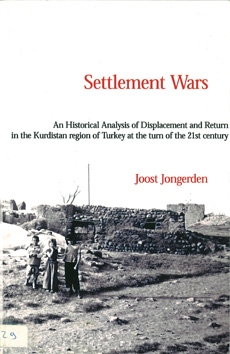|
PREFACE
The research for this thesis was conducted during the period 2002 - 2005, although its origins date back several years before that. In the summer of 1996, over the weekend of June 3-4, the United Nations Conference on Human Setdements (Habitat) assembled in Istanbul to “endorse the universal goals of ensuring adequate shelter for all and making human setdement safer, healthier, and more livable, equitable, sustainable and productive”. Delegations to the UN Habitat Conference in Istanbul presented their governments’ ‘national reports’ on how to provide adequate shelter, stimulate social development, eradicate poverty, protect the environment and develop the economy, all while adhering to good governance. The National Report and Action Rian prepared by the host country, Turkey, unfolded its plan for the development of a peaceful and stable city life, the improvement and renewal of gecekondu (shanty town) housing, and the provision of adequate shelter for those citizens who had lost their homes in the southeast of Turkey as a result of the twelve-year war between the state and the PKK. The report was purportedly a product of co-creation of nearly 244 organizations, three-quarters of which were non-governmental bodies or civil society organizations.
Several civil society organizations, among them the human rights organization I HD (Insan Haklari Dernegi), criticized the National Report and Action Rian because, they argued, it was marked by ‘omissions’. First, the production of the national report on adequate housing and sustainable settlement was characterized by an institutional omission. Although the report was supposedly a product of co-creation between State and civil society organizations, non-governmental organizations claimed that the Turkish authorities had been selective in the process of (genuine) consultation with civil society organizations, largely ignoring those organizations which took a critical stand against State policies, particularly those organizations concerned with the so-called Kurdish issue. The second omission was related to the content of the report, which largely ignored the issue of the destruction of shelter and the mass-displacement of the peasant population in the Kurdistan region of southeast Turkey by the Turkish army. The same civil society organizations also criticized the UN for locating a conference on adequate housing in a country that had been systematically destroying settlements and people’s livelihoods.
In the shadow of the official UN conference, several civil society organizations organized an alternative habitat conference, in which such issues as the large scale displacement of the rural population in the Kurdistan region of Turkey was to be discussed. As background information, the Human Rights Association iHD distributed a report named The Burned and Evacuated Settlements’ which documented the destruction 2,047 rural settlements in the Kurdistan region of Turkey up to 1996. A debate about such issues was not welcomed by the Turkish authorities, and the opening session of the alternative forum was invaded by the police, who ordered the delegates to cease their activities and disperse. Although this intervention was severely criticized by delegates in the official conference, some sessions of the alternative forum had to be cancelled, and eventually the frightening and violent evacuation of rural settlements could only be discussed in a backwater room in the Beyoglu quarter in Istanbul.
I was myself in Istanbul at this time, participating in some of the sessions of the alternative forum. Together with two colleagues, for three weeks I carried out interviews for a collaborative publication on the displacement of the rural population in the Kurdistan region of Turkey. We interviewed Kurds in Istanbul whose villages had been destroyed and evacuated and who had gone through a living hell. These victims of the violent campaign of displacement had settled in new districts on the city outskirts, such as Umraniye, where they crowded in with relatives and constructed shanty dwellings, or they had rented rooms in one of the dilapidated backstreets of an old quarter like Beyoğlu.
Among the people we interviewed was an elderly couple in their seventies, occupying one such room in a ramshackle building in Beyoglu. The man explained how, the year before, in 1995, the Turkish army had forcibly evacuated and then torched his village near the district town of Ovacik in the province of Tunceli (Dersim). He explained to us that this was not the first time that the village in which he lived had been evacuated and destroyed by the military, displacing him and his family. I n the summer of 1938, in his early childhood, he had been among the people from Ovacik who were herded together by soldiers to be deported, first to Hozat and later to Elazig. From there, the families were scattered over Turkey, some to Konya, others to Balikesir, Bolu, or Çankiri. Only after an exile (sürgün) of more than 10 years were he and his family finally permitted to return. “How many years”, the man asked, “will it take until we are allowed to return this time?”
The issue of people’s return to their villages had entered the political agenda in Turkey in 1994, the year before the evacuation of the village of the old man and-his wife. Since then various return initiatives have been announced, including the ‘Village Return Southeast Anatolia Restoration Project’ (Koye Donüs Güneydogu Anadolu Onarim Projesi) and the ‘East and Southeast Anatolia Village Return and Rehabilitation Project Sub-Regional Development Plan’ ([Dogu ve Güneydogu Anadolu Bölgesi Koye Dönüș ve Rehabilitasyon Projesi Ait Bölge Gelișme Planı). Village evacuations continued, however, and the implementation of village return schemes never did take place. It was in this context and against this background that the 2002 - 2005 research was conducted.
|
